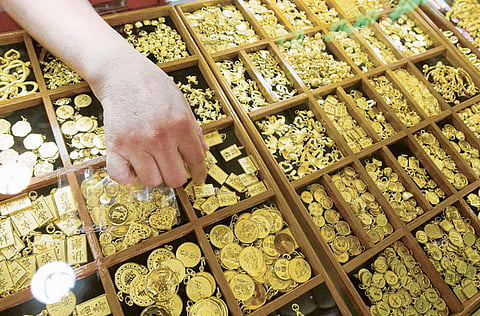Gold price hits a new record on economic concerns
Yellow metal is projected to touch $2,000 in the next few months

Dubai: Slow economic growth and debt concerns sent gold spiralling to nearly $1,900 (Dh6,977) an ounce on Monday.
It hit a record as the price climbed to as high as $1,894.80 an ounce in London, beating its last high of $1,878.15 on Friday.
Up 15 per cent in August, the precious metal, which was earlier expected to hit $2,000 an ounce by 2015, is now likely to touch the mark in the next few months.
Pradeep Unni, senior commodity analyst at Richcomm Global Services, said: "If the current momentum and macro-economic fears fail to recede, we can see this [$2,000 an ounce mark] being scaled, well before year-end. This is given the speed of about two to five per cent every week."
He further warned that this swift rally is "clearly detrimental" to the overall bullish trend of the metal".
"Any investor should brace for volatile and violent corrections very soon," Unni said.
Large spikes
According to a Reuters report some analysts say gold could jump to $2,000 an ounce "within the coming weeks" with the potential for very large spikes if risk aversion on financial markets gains momentum.
Listing key factors behind yesterday's increase, Richcomm's Unni said that a persistent flow of "weak macro data" out of the United States and a "complete lack of confidence" in EU's management of debt are responsible for the consecutive record highs.
"Investors are waiting for signs of further stimulus [quantitative easing-3] from the US Federal Reserve to revive the economy. Additional bond purchases by the Fed could raise inflation outlook and further boost gold. Investors have been left with very few options other than gold to park their money," Unni told Gulf News.
He, however, dismissed the probability of political tensions in Libya triggering the gold price hike. "From what we hear, tensions in Libya are nearing the end. Thus the weekend rally in gold isn't because of the Libyan tensions. Geo-political tensions have always propelled gold. But of late, macro-economic factors have dominated the rally," said Unni.
In its quarterly report last week, the World Gold Council (WGC) said that escalating gold prices resulted in global demand falling by 17 per cent in the second quarter of 2011 over the same period a year earlier.
Heavy profit-taking
Asked how bullion was expected to fare by the end of the year, Unni said: "Though it could be a sustained rally, I fear that by year-end there could be a correction and we may see heavy profit-taking."
Asked how the price hike could impact gold sales in the UAE, Raj Sahai, Director-Retail at Damas, said: "Certain consumer segments are affected by the rising prices of gold but not others. And so there is not too much of an impact on sales in value terms."
According to the WGC report, Asian buying and global economic concerns are expected to drive gold consumption for the rest of the year.
The council's second-quarter 2011 estimates revealed that gold consumption (in value) went up almost five per cent year-on-year to $44.5 billion, the second-highest amount ever.
- 15%: gains posted by gold in August
- $44.5b: value of global gold consumption this year, according to WGC
- 17%: decline in gold demand in second-quarter compared to same period last year


